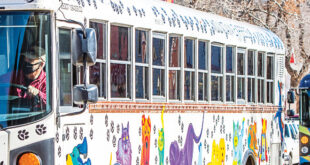Staying sustainable
By Lauren Porter
How many times a day do we throw something in the garbage without thinking to recycle it? We fill our trash bins with reusable material (both organic and artificial) not realizing the heavy impact our carelessness has on the environment. Our waste loiters on our sidewalks, festers in our oceans, and destroys ecosystems around the planet. This is a problem that wreaks havoc on the natural order of our earth; it is time for a solution.
At a point in earth’s history when climate change is on par with extinction, the Fourth National Climate Assessment was released on November 23, 2018, in the wake of a distracting Thanksgiving weekend.
Although the report itself was issued quietly, the detriment of the situation was loud and distressing to those who heard it. The report warns “The impacts of global climate change are already being felt in the United States… but the severity of future impacts will depend largely on actions taken to reduce greenhouse gas emissions,” i.e., the harmful levels of methane and carbon dioxide found sitting in our landfills.
So, let’s do a little more trash talk. In 2014, the Colorado Department of Public Health and Environment (CDPHE) reported that around 23 percent of the 9 million tons of waste was diverted from Colorado landfills because of recycling and reducing materials. This staggering statistic falls behind the national average, which is above 35 percent.
In response to such alarming numbers, the Recycling Resources Economic Opportunity (RREO) grant was created by the CDPHE. To put it into practice, a landfill tipping fee is implemented so that when people dump their waste, a small portion of the landfill fee goes into the grant for recycling/economic purposes. Each year, around $2 million gets distributed to private, state and local entities in support of sustainability efforts. Among the recipients for 2018 was Western Colorado University.
The Crested Butte News spoke with Nathan King, director of sustainability at WCU, about how the grant will help move the university to become a zero-waste facility. King said that with the funds provided by the grant, Western will construct and install a Rocket Composter for food waste at the University Center, at which a large percentage of students dine daily.
The magic happens when food waste comes down from the dining halls and goes through a pulper extractor, which chips everything up and sucks the moisture out. Then, an even mixture comprised of wood chips and food waste is added through the top of the Rocket’s chute. This ensures that a good ratio of nitrogen green material and brown carbon material is brewing inside.
Once the mixture is added, the temperatures must be favorable for the microorganisms to break down the organic matter. This usually takes place around 120 degrees. Thankfully, the composter has a heating system inside, so it should be well tailored to work in our cold and snowy climate.
Finally, after a few weeks of churning, the compost is expelled from the bottom of the chute and taken to Chipeta Gardens for use. If there is excess, it can be utilized on campus grounds, and possibly given to the community in the future. If the machine works at full capacity, it is estimated that about 900 gallons of mixed waste can be composted each week. Annually, about 5,000 gallons (10 Dumpster loads) of waste will be diverted from the landfill, according to King.
The Rocket Composter is expected to make its debut in spring 2019, in addition to the recycling programs that are already thriving on campus. Although this isn’t a fix-all solution to the world’s environmental problems, it is a huge step in the right direction toward making Western, and the Gunnison community, the gold standard of environmental sustainability.
 The Crested Butte News Serving the Gunnison Valley since 1999
The Crested Butte News Serving the Gunnison Valley since 1999


